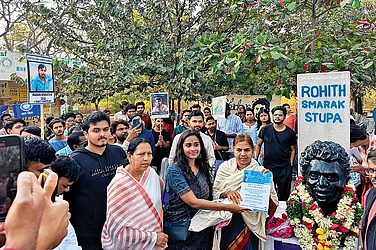As the fight for indigenous rights of the Adivasis gets strengthened across the country — from Jharkhand to Chhattisgarh and from Assam to Nagaland, Outlook on January 15, 2023 celebrated the ‘reimagination’ of discourses.
Taking a deep dive into the social complexities and nuances, Outlook through their programme titled Reimagining Chhattisgarh, in collaboration with the state government, opened up the space for debate where an alternative and indigenous model of development could be looked at. In words of our CEO Indranil Roy, it is more about looking at the “long term perspective” that initiates a conversation without searching a determinist, temporal end.
The conversation whereas on one hand touched upon the current conditions of Bastar, development feminism, and ecological sustainability in the presence of Chhattisgarh Chief Minister Bhupesh Baghel, poet Ashok Vajpeyi, and scholars like Bela Bhatia, on the other hand it celebrated the people who contributed to the preservation of indigenous culture and politics. Outlook felicitated Syed Ayyub Alimeer for his contribution to keeping the essence of Chhattisgarh's indigenous language intact. It also recognised the works of Ram Kumar Patel, Rom Shankar, Kamla Bai, and several others for their contributions ranging from protection of forest rights to upholding and safeguarding indigenous handicrafts.
Our engagement with the Adivasi politics and their struggle for rights over Jal, Jungle, Jameen, however, started when our Editor Chinki Sinha extensively travelled through different regions of Jharkhand to understand the indigenous way of perceiving lives. The question of cultural appropriation haunted us throughout but when we came up with our magazine issue of December 5, 2022, titled Jal, Jungle, Jameen, we tried to listen to the voices of the people who have been struggling for long to save their social, cultural, and political identities.
With the Hemant Soren-led Jharkhand government’s efforts to pass Sarna Code bill that proposes to legitimise Adivasi claims over their own religion Sarna, far away from the dominant ritualistic Hinduism that for years has tried to accommodate them, we found the impetus to ask — what is Sarna all about? How is it different from the dominant organised religions? How does it affect the cultural lives of Adivasis? Searching for the roots of the debates, we asked several Adivasi scholars like Ashwini Kumar Pankaj and Vandana Tete —to name a few— to give their perspectives.
In the conversation built upon different claims over histories, we find how Gandhi’s celebrated Satyagraha was influenced by Adivasi movements. We got to know about the disenchantment among the Adivasis with the imposition of organised religious codes. We treaded through the paths of Adivasi literature and certainly found the impeccable possibilities that they do have to be celebrated as South Asian literature.
When our Editor Chinki Sinha went to the village of Asuras, a community that considers themselves as the descendant of buffalo king Mahishahsura, who was mythologically killed by Goddess Durga to end the social evil, she found new God who is both immanent and transcendent — the God of Nature. Taking cue from Adivasi scholar and poet Abhay Xaxa, we found the essence of ecological ethnicity —an effort to celebrate environment and its friendship without disturbing and destroying it— as a path to alternative development.
Adivasi poet Jacinta Kerketta’s words perhaps describe the politics of indigeneity in a more nuanced way. In her poem that she read out to Sinha, she discards the lures of ‘life after death’ and comes up with the idea of a lifeworld that wants to stay with the nature even if she is gone. Today as Outlook again celebrates the alternative lifeworld, beyond the normative developmental model of a post-consumerist market, we recall Jacinta’s lines:
‘Look how poor, deprived you are,’ they said,
‘This is a retribution for your sins.’
We showed them the expanse of our fields,
Our forests, rivers, mountains and streams,
And the heaps of grains in our granaries.
They then said,
‘A better world awaits you after death.’
We replied, ‘There is no world after that.
Right here, with our ancestors, we remain
And dwell amidst our generations to come.’


























